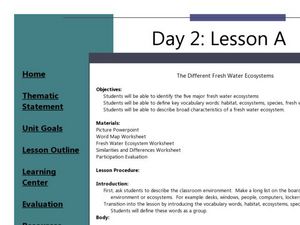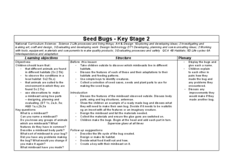Curated OER
ProjectWILD Aquatic: Migration Headache
Learners explore the important factors that affect habitat quality and the associated survival of migratory water bird populations. They discuss an organisms dependency upon a variety of habitats and habitat quality. Students play a game...
Curated OER
Create a Habitat for an Animal
In this marine life worksheet, students label the ocean animal and each part of its habitat. Students then draw one of the habitats including the animals and plants that live there.
Curated OER
Winter Animal Match
Students play a game. In this matching lesson, students learn about animals and their winter homes. Students match cards of animals with the cards of winter homes.
Curated OER
Paper Sculpture Habitats
Students develop skills in sculpture. They acknowledge that sculpture can be made in a variety of ways. Students encounter different ways paper can be manipulated. They gain experience in collaboration.
Curated OER
Animals: Here and Now
Discuss and identify natural habitats of animals commonly found in zoos. The class constructs and displays small "zoo like" models to show a chosen animal habitat. They write a short story or diary about an animal or pet of their choice....
Curated OER
Where Do Animals Come From?
Young scholars use library search engines to research an animal and its origin. For this animal research lesson, students research their assigned animal using ProQuest. Young scholars then find the country of origin of the animal using a...
Curated OER
Goals of the Diversity of Life Unit
Students are introduced to the unit on the importance of diversity of life and the role that interdependence plays in our worlds. this is part of a multi-lesson unit on the diversity of life.
Curated OER
Creative Classification
Students create an animal by using physical characteristics to classify that animal in the Linnaean Classification System. This instructional activity is part of a multi-segmented unit on the diversity of life.
Curated OER
Mariposas
Students examine how animals use camouflage for survival. In this investigative lesson students define vocabulary words and see how it is the environment that controls which adaptations will help in survival.
Curated OER
Ocean Microstructure Lesson Plan
Young scholars explore the microstructure of the ocean by analyzing graphs created by Dr. Mike Gregg of the University of Washington Applied Physics Laboratory during the EPIC 2001 research cruise on the Ronald H. Brown NOAA vessel.
Curated OER
Tackling Taxonomy
Young scholars study physical characteristics of separate phyla and place them into similar groups. This lesson is part of a multi-segmented unit on the diversity of life. students develop a classification system by grouping animals into...
Curated OER
Amusing Animal Adaptations
Students identify how animals adapt characteristics to help them survive or reproduce. In this animal lesson, students draw pictures of their animal and adaptation.
Curated OER
The Different Fresh Water Ecosystems
Students summarize the characteristics of an ecosystem. For this biology lesson, students identify five major fresh water ecosystem. They define terms and write a journal about what they learned.
Curated OER
Understanding Life System: Growth and Changes in Plants
Third graders research ways in which plants are essential to humans. In this Global Peace lesson, 3rd graders participate in tasks, such as creating a propaganda poster. Students may watch the film, The Lorax, as a closing activity.
Curated OER
What's in That Cake?
Students explore the depths of the Gulf of Mexico. In this deep-sea habitat lesson, students construct edible models of deep-sea habitats as they bake cakes that include representations of the habitats and the organisms that live there....
Curated OER
What's in that Cake?
Learners discover the methods scientists use to investigate Oceanic habitats. In this oceanography lesson, students utilize the Internet to identify deep sea submersibles and how they help scientists study the Charleston Bump....
Curated OER
Keep it Complex
Students consider the importance of biodiversity in the ocean layers. In this oceanography lesson, students use the Shannon-Weaver diversity index to analyze data. Students analyze the information collected and write a report...
Curated OER
What Was for Dinner?
Students examine energy obtaining strategies that are used by organisms in deep reef communities. For this ocean lesson students complete an isotope activity.
Curated OER
Seed Bugs; Stage 2
Students examine nature by participating in an environmental art activity. In this imaginary creature lesson, students discuss the importance of a habitat when pertaining to wild animals or bugs. Students utilize tree parts which they...
Curated OER
Be on the Lookout!
Students create "Wanted" posters for destructive bugs. They practice research skills as they learn about the characteristics, diets, habitats, and habits of a variety of bugs.
Curated OER
A Giraffe Debate
Learners study the life, adaptations, and habitats of giraffes. They investigate the issue of giraffe survival in the wild or in a wildlife sanctuary. They conduct a class debate and present position papers.
Curated OER
Wild Animal Investigation - Habitat Diorama
Students research wild animals in cooperative groups and use their information to construct habitat dioramas. They demonstrate competence in using different information sources, including those of a technical nature, to accomplish...
Curated OER
Earthworm Bridge
Fourth graders complete analysis experiments for decomposers and their adaptable traits. In this decomposers lesson, 4th graders test worm behavior to light, sound, warmth, touch, and moisture. Students work in groups to analyze the...
Curated OER
Mapping Your Schoolyard Habitat
Students explore the terrain, structures, plants and signs of habitats around their schoolyard. They draw a sketch map showing the different areas around the schoolyard. Students identify the location of weeds and native plants on their...

























